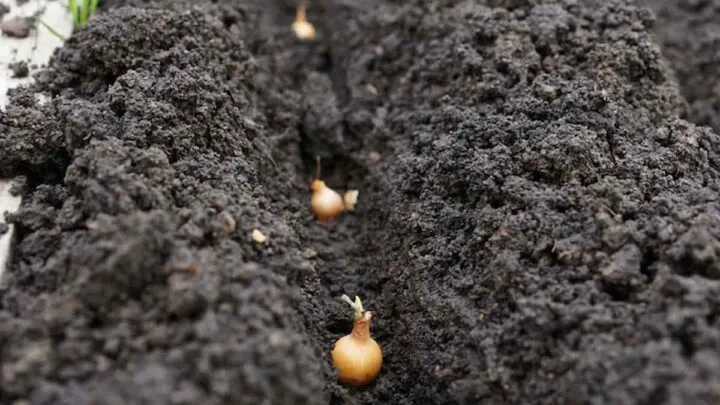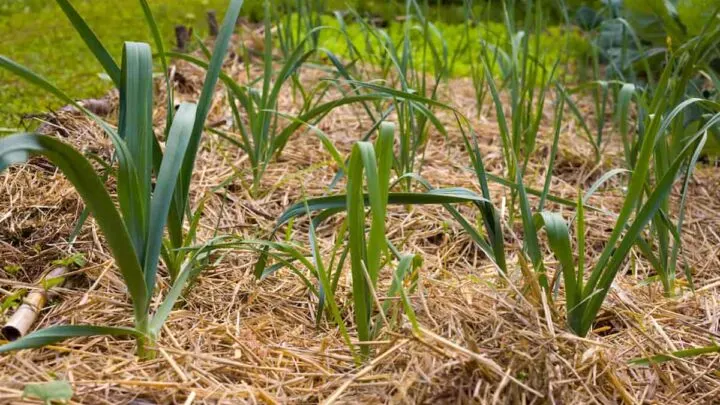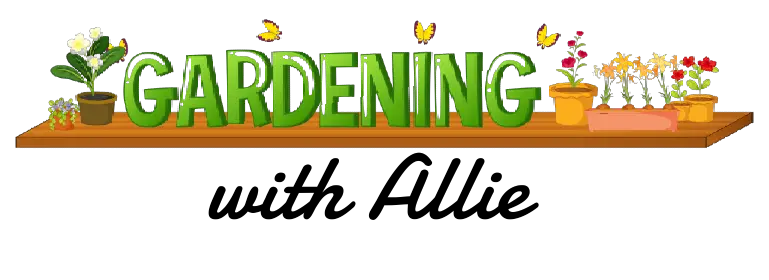As onions grow, they form a bulb underground. Their growth cannot be seen, and if it can in the form of a shoot from underground, it’s time to pick them. Because of onions’ form of growth and development, growers must take care to plant them correctly and not go too deep when sowing seeds. Many think that onions should be buried deep into the ground because they form bulbs underground. But, can you plant onions too deep?
Generally, you can’t plant onions too deep. As a rule of thumb, it’s suggested to only sow about 1 to 1.5 inches in depth, leaving room for development and preventing stunted growth.
When planting onions, gardeners should consider the depth, soil, conditions, and exposure to the sun. If your onions are not growing or you’re just looking for tips for growing onions, we’ve got you covered below.

How Deep Should Onions Be Planted?
There are a few ways to plant and grow onions, including from seeds and small bulbs known as sets. Starting from seed is the most difficult, as it can take a while for bulbs to form. They also have a lot of maintenance and are easily prone to weeds and insects. From seed, onions should not be planted too deep, only covering each with about half an inch into the soil.
For sets, it’s okay to go a bit deeper. It’s recommended to plant anywhere from 1 to 1.5 inches into the ground, giving the bulb plenty of space to root in and grow to make a nice, round bulb.
With both seeds and sets, leave at least 2 inches between each when planting to avoid overcrowding.
Why Are My Onions Not Growing?
Growing onions is relatively easy, only taking a quick poke in the ground and a bit of water and sunlight. If you’ve got onions that won’t grow, it may be fixable with a few adjustments. When growing onions, be sure to:
- Plant in early spring
- Give onions plenty of space in between to sprout and grow
- Add organic matter to the soil before planting
- Keep soil moist
When To Plant Onions
Onions can survive cold temperatures and freezes, which is why it’s okay to plant them in early spring. You may plant your onions before your other crops, giving them time to root and grow into bulbs before fall.

Best Soil for Onions
When planting, make sure to keep the soil nice and loosened up so that roots can sprout. Onions like nice and crumbly soil so their roots can spread out and find moisture and nutrients underground. Start with dry soil and loosen it a bit, only planting when it’s nice and loose. Remove any debris or rocks so that they don’t interfere with roots.
Fertilizing Onions
Onions like nutrients, so it’s recommended to use a fertilizer. Work it into the soil before planting, focusing on the first 3 to 4 inches of soil. Mix it all in and let it sit for a day before planting seeds or bulbs. After planting, you can always add a bit of fertilizer to keep the soil healthy, doing so no more than once a month.
How Much Water Do Onions Need?
When planting in the early spring, temperatures are likely very mild, and the soil stays moist. At this time, onions need water about once a week. Once temperatures rise in late spring and summer, you’ll need to amp it up a bit, giving them water daily to keep the soil moist.
How To Harvest Onions
When bulbs are big and ready to go, there are a few signs to look for. One is the stalk, which typically stands up tall. Once the bulbs are ready, these stalks will start to fall and wilt to the ground. Once that happens, pull the bulbs out of the ground and let them sit for a day or two to dry before removing the roots. Once roots are removed, give them another day to dry before enjoying them.
Shallow Vs. Deep Planting
Growers can plant onions both shallow and deep, depending on what they’re starting with. Shallow and deeper planting are optional with onions, though each has its own pros and cons.

Planting Onions Shallow
Planting shallow is best for seeds. They don’t need to be covered by too much soil and need to be in a spot filled with good sunlight and get plenty of moisture after each watering.
Pros
- Nothing technical
- Quick
- Gives seeds room to root
Cons
- Prone to weeds and other damages as a small seedling
- Takes a long time to grow
- Could bloom (bolt) before growing into a bulb
Planting Onions Deep
Planting onions deep works better for bulbs that have already grown. While they’re easier to grow, they take time to do so, requiring moisture and sun as they sprout roots.
Pros
- Sets and bulbs are easier to grow
- Can stay underground throughout winter
- Most reseed in the spring
Cons
- Requires loose soil
- Need a lot of moisture

Hi there, my name is Allie and welcome to my blog; GareningWithAllie!
Much of what you see written here is just our personal experiences with gardening. Along with the content I write here, there is also a unique collection of gardening topics covered by some of our close friends. I hope you find everything you read here to be helpful, informative, and something that can make your gardening journey the most lovely experience ever! With that said, Happy Gardening!
